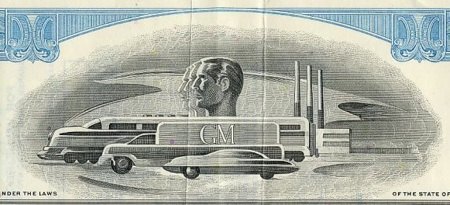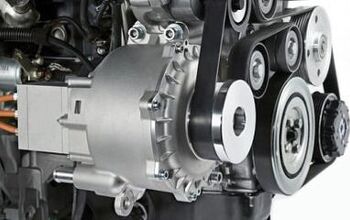Time to Nationalize GM?
That ain’t me talkin’ (no, no, no, it ain’t me, babe). The headline comes straight to you from CNNMoney, with a little help from Chris Isidore—a reporter who literally laughed down the phone a year or so ago when I suggested GM would go Tango Uniform. So, from what industry could Mr. Isidore find anyone with a shred of credibility—without a bust of Lenin on their desk—who’d argue to nationalize GM (other than the people who’ve already done it)? Rail!
Larry Kaufman, a former rail executive and consultant, argued in a railroad industry newsletter Monday that the U.S. Railway Association, the special government agency set up in 1974 to deal with bankrupt railroads, is a good model for saving the U.S. auto industry…
Kaufman suggested that a special government agency would help the companies continue to sell cars while they reorganize because it would assure consumers that the companies and their warranties were not about to disappear.
OK, that’s one. Here’s another.
John Barnum, a former deputy secretary of transportation who was involved with the creation of the USRA and Conrail, said taxpayers are likely to lose an even greater percentage of the loans already made or requested by GM and Chrysler unless the government takes a more direct role in restructuring the companies.
“You can not let the people who mucked it up to this point continue to get tax dollars,” said Barnum, now an attorney at with McGuireWoods LLP.
He argues that a government agency making the decisions during a bankruptcy reorganization would work better than having the companies trying to reorganize themselves.
“That’s the only way to get the industry slimmed down to where it can make money again,” he argues. “The bankruptcy courts can’t do it alone.”
Any more takers on this idea? Someone OUTSIDE the fail industry perhaps? Hey, CNN doesn’t pay Isidore just for regurgitating other people’s papers (says a professional regurgitator).
One auto analyst thinks the idea of nationalization, while not perfect, may be the best of the available options — especially since the government has already committed billions of dollars to trying to save GM and Chrysler.
“We’re paying for it anyway,” said Kevin Tynan, auto analyst with Argus Research. “Would it be that much worse than the people now at GM continuing to make the decisions?”
I’m thinking . . . yes. Yes, it would.
UPDATE: Slate columnist Matthew DeBord continues his call for a “soft nationalization” of GM and Chrysler. [Thanks to Detroit-Iron for the link.]
GM leapfrogged the Japanese on electrification, and this was strategically smart because GM knew it was going to get clobbered on hybrids. We need to keep this and other advanced-mobility development alive for reasons that have nothing to do with Detroit’s survival and everything to do with the fact that, as Lewis points out, we’ve run out of air in which to put our CO2. It’s our own survival we should be worried about.
In the recent past, I’ve argued for a “soft” nationalization of the U.S. auto industry, but it’s become clear, based on how much it’s going to cost us to keep GM and Chrysler alone in business, that a good old-fashioned hard nationalization is now a better long-term option and would deliver a better return-on-investment. We won’t get our money back, but we will be able to put GM in a position to use its immense manufacturing capacity to begin the process of replacing oil-consuming vehicles with EVs, a transitional process that will consume decades.
More by Robert Farago
Latest Car Reviews
Read moreLatest Product Reviews
Read moreRecent Comments
- EBFlex No they shouldn’t. It would be signing their death warrant. The UAW is steadfast in moving as much production out of this country as possible
- Groza George The South is one of the few places in the U.S. where we still build cars. Unionizing Southern factories will speed up the move to Mexico.
- FreedMike I'd say that question is up to the southern auto workers. If I were in their shoes, I probably wouldn't if the wages/benefits were at at some kind of parity with unionized shops. But let's be clear here: the only thing keeping those wages/benefits at par IS the threat of unionization.
- 1995 SC So if they vote it down, the UAW gets to keep trying. Is there a means for a UAW factory to decide they no longer wish to be represented and vote the union out?
- Lorenzo The Longshoreman/philosopher Eri Hoffer postulated "Every great cause begins as a movement, becomes a business, and ends up as a racket." That pretty much describes the progression of the United Auto Workers since World War II, so if THEY are the union, the answer is 'no'.


































Comments
Join the conversation
Considering both GM and Chrysler are probably net liabilities at this point anyway (hell, Daimler consider Chrysler a net liability some years ago now), the US fedgov has already "invested" more in these two than they are worth. They're insolvent, pure and simple....GM lost money for the last four years in a row. Hence they're no longer "going concern" commercial enterprises, they have become government charity cases, a vehicle manufacturing version of Amtrack. Just let them fold, total liquidation, Chapter 7 for both. Beats the alternative, which is to keep them on trickle finance life support for....what, another 4 years? While their market share continues to evaporate into the teens? Then what?